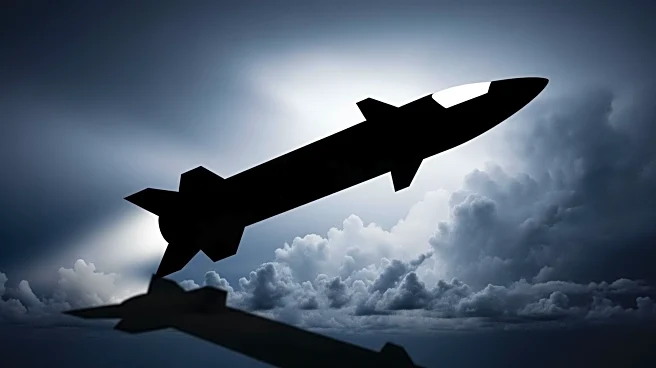What's Happening?
Russian President Vladimir Putin has announced the successful testing of the Burevestnik, a nuclear-powered cruise missile, which is claimed to have the capability to evade Western air defenses and strike the United States. The missile, also known by
its NATO designation SSC-X-9 Skyfall, was tested as part of a series of military exercises involving Russia's nuclear triad, including intercontinental ballistic missiles, strategic bombers, and submarines. The Burevestnik reportedly covered approximately 14,000 kilometers in a 15-hour test flight. This development comes amid heightened tensions between Russia and the United States, with the latter imposing sanctions on Russia due to the ongoing conflict in Ukraine.
Why It's Important?
The testing of the Burevestnik missile underscores the escalating arms race between Russia and the United States, particularly in the realm of advanced nuclear weaponry. The missile's purported ability to bypass existing defense systems poses a significant challenge to U.S. national security and could potentially alter the strategic balance. The U.S. has already imposed sanctions on Russia, and further measures are being considered if the conflict in Ukraine persists. This development could lead to increased military spending and a reevaluation of defense strategies by the U.S. and its allies, as they seek to counteract the threat posed by such advanced weaponry.
What's Next?
The U.S. government is likely to continue monitoring Russia's military advancements closely and may respond with additional sanctions or diplomatic measures. The ongoing conflict in Ukraine remains a critical factor in U.S.-Russia relations, and the potential for further escalation could prompt international calls for renewed arms control negotiations. Additionally, the U.S. defense establishment may prioritize the development of new technologies and strategies to counteract the capabilities of the Burevestnik and similar weapons.
Beyond the Headlines
The development and testing of the Burevestnik missile highlight the broader implications of nuclear proliferation and the challenges of maintaining global security. The missile's capabilities raise ethical and legal questions about the deployment of nuclear-powered weapons and their potential environmental impact. Furthermore, the advancement of such technology could trigger a new era of arms competition, prompting other nations to pursue similar capabilities, thereby increasing the risk of nuclear conflict.















